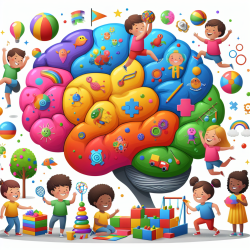The Surprising Link Between Sensory and Motor Skills and Cognitive Development
In the realm of child development, the significance of sensory and motor skills cannot be overstated. Recent research, including the study titled "Sensory and Motor Deficits as Contributors to Early Cognitive Impairment" by Sayyid et al., highlights how these skills play a crucial role in cognitive development. As practitioners, understanding and implementing these findings can significantly enhance our ability to support children's developmental trajectories.
Understanding the Research
The study conducted by Sayyid and colleagues involved 650 participants from the Baltimore Longitudinal Study of Aging. It employed structural equation modeling to assess the relationship between sensory and motor functions and early cognitive impairment (ECI). The results revealed that improvements in multisensory, fine motor, and gross motor functions were associated with reduced odds of ECI. Specifically, each unit improvement in these functions decreased the odds of ECI by 32%, 30%, and 12%, respectively.
Key Takeaways for Practitioners
As practitioners focused on creating positive outcomes for children, these findings provide actionable insights:
- Early Detection and Intervention: Sensory and motor impairments can serve as early indicators of cognitive challenges. By identifying these impairments early, we can implement targeted interventions to mitigate their impact on cognitive development.
- Holistic Assessment: Incorporate assessments of multisensory, fine motor, and gross motor skills into regular evaluations. This comprehensive approach ensures that potential issues are identified and addressed promptly.
- Data-Driven Interventions: Utilize data from assessments to tailor interventions that address specific sensory and motor deficits. This personalized approach enhances the effectiveness of therapeutic strategies.
Encouraging Further Research
While the study provides valuable insights, it also underscores the need for further research. Understanding the mechanisms through which sensory and motor functions influence cognitive development can inform the creation of more effective interventions. Practitioners are encouraged to contribute to this body of knowledge by conducting studies and sharing findings with the broader community.
Implementing Change in Practice
To implement the findings from this research, consider the following strategies:
- Collaborative Efforts: Work with multidisciplinary teams, including occupational therapists and educators, to create comprehensive intervention plans that address sensory and motor deficits.
- Professional Development: Engage in continuous learning to stay updated on the latest research and intervention techniques related to sensory and motor skills.
- Parental Involvement: Educate parents about the importance of sensory and motor development and provide them with strategies to support their child's growth at home.
Conclusion
The link between sensory and motor skills and cognitive development is a vital area of focus for practitioners dedicated to improving children's outcomes. By integrating data-driven strategies and fostering collaborative efforts, we can enhance our ability to support children in reaching their full potential. For a deeper dive into the research, you can access the original study here: Sensory and motor deficits as contributors to early cognitive impairment.










